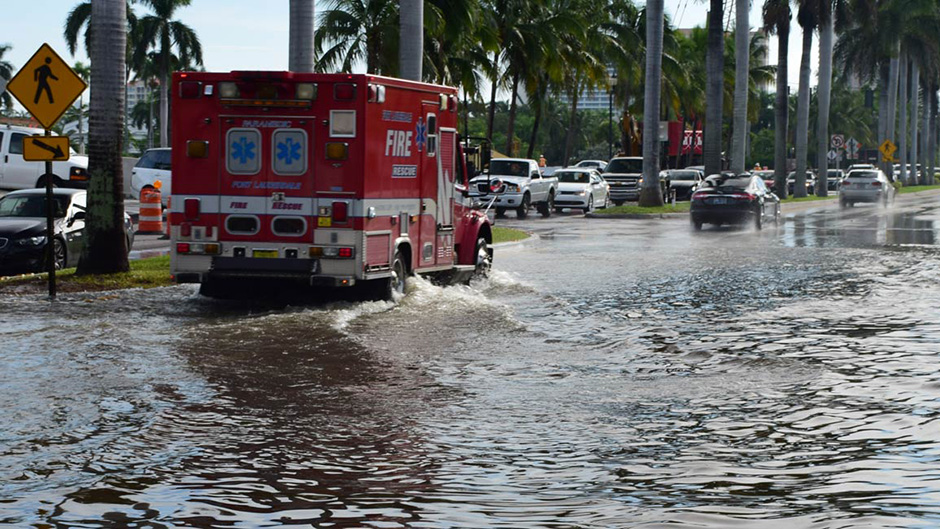Three interdisciplinary teams have been awarded Phase II grants from the University of Miami Laboratory for Integrative Knowledge (U-LINK) for research projects that relate to two grave challenges—climate change and domestic terrorism.
Given U-LINK’s mission of forging interdisciplinary collaborations to solve complex problems, the awards advancing projects that aim to counter extremist conspiracy theories, promote “hyper-local” climate adaptation strategies, and design the next-generation of coastal protections aren’t surprising. But it wasn’t easy for the U-LINK Action Team to choose which three of the seven teams awarded Phase I funding last year would advance to Phase II.
“We had to make some tough decisions about which of the big problems that were being addressed by our Phase I teams required the most creativity and the greatest degree of innovation,” said Susan Morgan, associate provost for research and U-LINK’s co-director. “There’s also a dialectical tension between what is currently unknown and what is actually doable. The Action Team had to assess which teams were poised to make a real impact within the two-year timeframe of Phase II.”
During this award cycle, the Action Team also renewed Phase II funding for two teams awarded U-LINK’s inaugural Phase II grants. They are the HURAKAN team, which is working to improve the graphic products that the National Hurricane Center uses to convey the risks and uncertainties of approaching storms, and the coastal resilience team, which is testing the effectiveness of innovative wave mitigation strategies, such as heat-resistant corals and cement/coral hybrids, to protect coastlines that are increasingly vulnerable to storm surges and wave-driven flooding.
A key initiative of the University’s Roadmap to Our New Century, U-LINK was launched by the Office of the Provost in 2016 to nurture UM’s burgeoning culture of multidisciplinary inquiry and accelerate problem-solving innovations. The eight-month Phase I grants of $40,000 are intended to help multidisciplinary teams learn the art of collaboration, forge a shared vision, and refine their approach to their topic; the Phase II grants of $150,000 a year for up to two years are designed to advance the most promising projects to the stage where they can attract external funding.
“We are very pleased with the progress that U-LINK has made in just two short years,” said John Bixby, vice provost for research, who directs the U-LINK initiative. “Faculty from each campus, and from disciplines as disparate as physics and the creative arts, have embraced the concept of problem-based interdisciplinary research.”
The winning proposals and teams for U-LINK’s newest round of Phase II grants are:
CONNECT: Countering Online Networked Extremist Conspiracy Theories
This team is exploring how the misinformation that engenders extremist conspiracy theories, which the FBI recently classified as a serious domestic terrorism threat, spreads unimpeded on social media networks. For now, members are focused on white genocide theories that have motivated mass shootings in houses of worship around the world by adherents who believe there is an organized plot to replace white people with darker-skinned immigrants.
The team’s goal is to develop a model that captures the causes and dynamics of the dissemination process as well as countermeasures that social media outlets and law enforcement authorities can use to halt the spread of the misinformation that breeds extremist conspiracy theories.
Team members include Manohar Murthi, associate professor of electrical and computer engineering; Joseph Uscinski, professor of political science; Casey Klofstad, associate professor of political science;John Funchion, associate professor in the Department of English; Michelle Seelig, associate professor in the Department of Cinema and Interactive Media; Kamal Premaratne, professor of electrical and computer engineering; Stefan Wuchty, associate professor in the Department of Computer Science; Caleb Everett, professor and chair of the Department of Anthropology; Lisa Baker, head of Richter Library’s Learning and Research Services; and Sandra Kübler, a linguist at Indiana University.
Hyper-localism: Transforming the Paradigm for Climate Adaptation
Recognizing that the impacts of climate change will differ from neighborhood to neighborhood, members of this team are exploring hyper-local, rather than regional, adaptations that will allow neighborhoods and communities to tailor effective climate actions plans for their unique circumstances.
Their goal is to move the conversation about climate change to a “people-first perspective” and, to that end, members are developing an Integrated Climate Risk Assessment protocol with community partners, including the CLEO Institute, Catalyst Miami, and The Nature Conservancy, to close the gap between top-down policies and neighborhood interests.
Team members include Amy Clement, professor in the Department of Atmospheric Sciences; Joanna Lombard, professor in the School of Architecture and Department of Public Health Sciences; Tyler Harrison, professor in the School of Communication; Sam Purkis, professor and chair in the Department of Marine Geosciences; Gina Maranto, director in the Abess Center for Ecosystem Science and Policy; and Angela Clark-Hughes, head of the Rosenstiel School of Marine and Atmospheric Science Library.
Next generation of coastal structures: Feasibility, quantification, and optimization
This team is developing prototypes for the next generation of bridges, breakwaters, seawalls, and other man-made coastal structures that can protect coastal communities from rising seas, flooding, and other effects of climate change—without negatively affecting coastal ecosystems or the beauty of the communities around them.
During Phase II, members plan to refine, test, and optimize their preliminary prototypes, which included artificial barrier islands made from discarded shipping containers, floating wetland mats, and lacy biophilic concrete structures that could attract a range of sea life.
Team members include Prannoy Suraneni, assistant professor, and Esber Andiroglu, associate professor of clinical, in the Department of Civil, Architectural and Environmental Engineering; Kathleen Sealey, associate professor of biology; Billie Lynn, associate professor of sculpture; Joel Lamere, assistant professor of architecture; David Kelly, professor of economics; Renato Molina, assistant professor of marine ecosystems and society; and James Sobczak, STEM librarian for Learning and Research Services.

